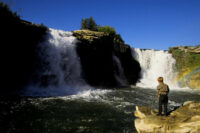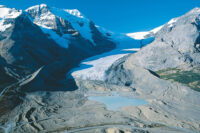Voters need to make the right choice for environment
By Braum Barber on August 25, 2021.
The first international effort to understand the impact of releasing massive amounts of carbon dioxide and methane into the atmosphere from the burning of oil, gas and coal was published in 1990. Over 30 years later, the Intergovernmental Panel on Climate Change continues to publish the synthesis of climate research based on the efforts of thousands of scientists worldwide.
The latest report continues to tell the same message as previous ones, only with much greater clarity.
It’s not looking good. We are in the midst of a climate emergency with an ever-diminishing amount of time to respond meaningfully. What does a climate catastrophe look like? If you haven’t heard, it is quite grim – even for wealthier nations accustomed to simply buying what they need. The recent IPCC report says that CO2 levels are higher than they’ve been since before the emergence of hominids two million years ago. These greenhouse gases trap a lot of energy in the lower atmosphere. Energy is heat. Climate is shifting northward bringing with it a higher number of extreme-hot days.
Hot air carries more moisture which can cause more extreme rain events, and more frequent and prolonged droughts. Weather extremes reduce food production, as witnessed across the prairies this summer. Secure food production is fundamental for maintaining a stable society.
The extra heat energy will continue to melt snowpack and glaciers, affecting natural river flows and threatening reliable water sources for irrigation, intensive livestock operations, and industry. Coniferous forests are already stressed and replanted clear-cuts will fail to thrive in this warming climate.
Dry forests burn, adding even more greenhouse gases to the atmosphere. Diminished forests hold less water for instream flow needs and late-season human uses.
Plants and animals that cannot shift with the climate to which they have adapted will go extinct. New disease and pest vectors will thrive, introducing further challenges to ecosystems on which we rely.
There is more: diminishing Arctic ice, disrupted ocean currents, rising sea levels, greater storm surges and inundation of coastal cities and farmland, ocean acidification, and a massive loss of fecund coral reefs.
The IPCC report is rich in details of the interrelations and impacts of climate disruption within our ecosystems – it is science.
Said more directly, it is warming almost everywhere, it is warming rapidly, it is going to get worse before it gets better, and it will only get better if we reach ‘net zero’ carbon emissions as soon as possible.
To achieve this with some modicum of international fairness is a daunting task. The scientists are not sugar-coating the risks of our continued indifference to greenhouse gas emissions. As one scientist has said: “There is nowhere to run, nowhere to hide.”
And, ultimately, we are all in this together (except, maybe, for a few billionaires hiding out in their prepper-villas in New Zealand).
A fundamental shift of this magnitude will require global cooperation and abundant financing. But there are individual acts that have a collective impact, too.
Waste less food, buy durable goods you really need, reuse and recycle, turn down the thermostat, plant a tree.
The best thing you can do in the near future that could make a difference: vote for a decision-maker willing to act.
Join SAGE this fall in asking what our municipal and federal leaders will do for our collective future and a stable climate. SAGE is a leading voice for a healthy and sustainable community.
-1




